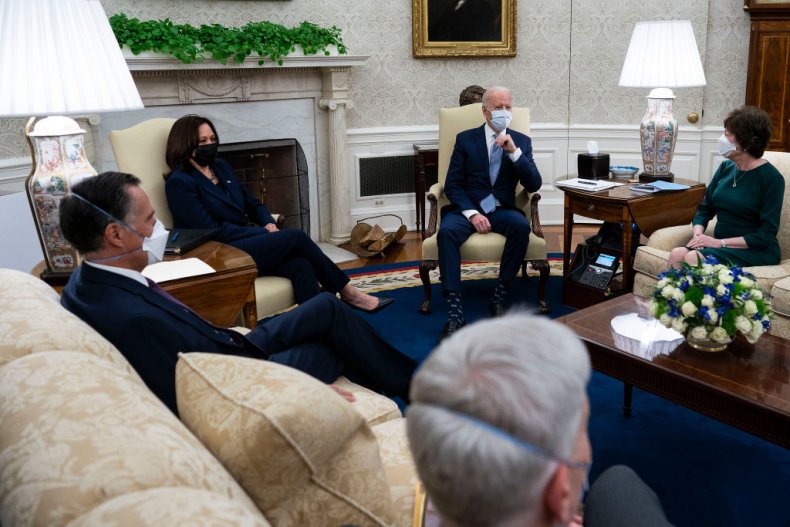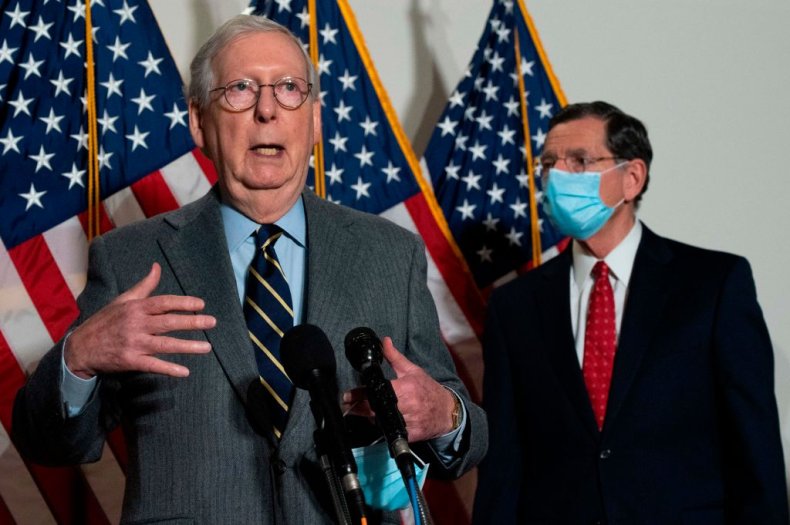As tensions continue to simmer within the Republican Party over the role of former President Donald Trump going forward, GOP lawmakers appear to be largely aligned behind a unified agenda of opposing President Joe Biden's policies.
Biden has repeatedly emphasized his desire to work with Congress in a bipartisan manner while he's in the White House. Although that sentiment has been welcomed by some Republicans, the reality of Biden's ambition appears to be playing out in a manner most Americans are all too familiar with—partisan gridlock.
Republicans may be at odds over their support or opposition to Trump, as evidenced by the bipartisan nature of the former president's second impeachment trial and the statements from some GOP senators condemning the former president after declining to vote to convict. But this internal party issue does not appear to be undermining conservative unity in the face of Biden's progressive agenda.
Representative Liz Cheney, a Wyoming Republican who serves as the No. 3 House Republican, received significant backlash from GOP colleagues for voting to impeach Trump following the January 6 insurrection against the U.S. Capitol. But condemnation of the former president does not translate into support for his Democratic predecessor.
"Because of reckless decisions made by the Biden Administration, counties in Wyoming will suffer," Cheney tweeted on Friday, raising concerns about Biden's decision to cancel the Keystone XL Pipeline. The same day, she took aim at Biden's $1.9 trillion COVID-19 relief proposal, calling the price tag "unsustainable" and warning that it "will make things worse" for the country.

Senate Minority Leader Mitch McConnell, a Kentucky Republican, who publicly rebuked Trump despite voting to acquit, has come out strongly against the new president's early policy efforts.
"Democrats' so-called relief bill includes Sen. Sanders's minimum wage proposal that would kill 1.4M American jobs. This after the President killed many thousands of jobs with Keystone XL," McConnell tweeted last week. "Killing jobs and destroying opportunity — that's their idea of pandemic relief?"
Meanwhile, Trump loyalists like Senators Josh Hawley of Missouri and Ted Cruz of Texas appear ready to oppose nearly everything Democrats put forward. Hawley has declined to cast a vote in support of any of Biden's Cabinet nominees thus far. Cruz has voted against all the nominees that have come up for a vote with the exception of Secretary of Defense Lloyd Austin.
Democrats' so-called relief bill includes Sen. Sanders’s minimum wage proposal that would kill 1.4M American jobs. This after the President killed many thousands of jobs with Keystone XL.
Killing jobs and destroying opportunity — that's their idea of pandemic relief?
— Leader McConnell (@LeaderMcConnell) February 8, 2021
Grant Reheer, a professor of political science at Syracuse University told Newsweek that he doesn't see "a lot of prospects" for Congress to govern in a bipartisan way "in the short term or the near long term." Reheer pointed out that the current level of political polarization has been decades in the making.
"Ironically, what it will probably take to create more bipartisanship is for one party to establish clear, stable control of an institution," Reheer said. "This happened for a good chunk of the 20th century with Democrats in Congress, and for a shorter period of time, with Republicans in the White House," he explained. "I don't see something equivalent to that situation on the near-term horizon."
Moderate GOP lawmakers, such as Senators Susan Collins of Maine, Lisa Murkowski of Alaska and Mitt Romney of Utah have made overtures for bipartisanship. These Republicans, joined by seven other GOP senators, put forward a substantially smaller $600 billion COVID-19 stimulus package. Although Biden met with the Republicans to discuss their proposal, it became clear that the president wasn't willing to compromise when the starting offer was less than a third of the size of his package—while also leaving out key Democratic priorities.
"Democrats may be able to get some support on some issues, like COVID relief. But even there, the general partisan disagreements will emerge again, as we have already seen," Hans Noel, an associate professor at Georgetown University who researches political coalitions told Newsweek. Noel pointed out that there are two key issues at play.
"One is the unwillingness of Republicans to cooperate. The other is the extent to which Biden is more progressive than even many Democrats appreciated during the primaries and general election. Biden has always been in the middle of his party, and as his party has moved left, so has he. The same is true for congressional leadership in Congress, which is more progressive than it was a few decades ago," he explained, predicting that this will make bipartisan agreement even harder going forward.
Noel said the idea of Republicans being in a "civil war" is "generally overstated," noting that they "are fairly united."

Democrats appear to recognize that bipartisan agreement will be difficult to achieve. When it comes to Biden's COVID-19 package, they have turned to the budget reconciliation process which would potentially allow them to pass the legislation without any GOP support. Due to the Senate's legislative filibuster rule, most bills need the backing of at least 60 senators to pass. With an evenly split—50 to 50—Senate, gaining the support of 10 Republicans amid the current high levels of polarization seems like a nearly impossible task.
"For Democrats, the fact that they are already going ahead with a one-party approach to the third stimulus suggests that bipartisanship is a secondary goal. Adding to that, Democrats will want to protect their slim margins of control in Congress as well as the White House, while Republicans will be keen to retake all three institutions, and they both see those goals as within their grasp," Reeher said. "That doesn't bode well for bipartisanship either."
If Republicans can keep Biden and Democrats from accomplishing their agenda, they believe this can potentially help them win back congressional control in 2022. They also don't have a vested interest in seeing the Biden administration succeed, just as Democrats did not have an interest in Trump succeeding. An unsuccessful president is much easier to criticize and run against in four years.
Reeher assessed that Republicans and Democrats working together "will take some leaders willing to lose." He added: "I haven't seen much of that lately."
U.S. - Latest - Google News
February 16, 2021 at 04:24AM
https://ift.tt/3b8kjpJ
Amid GOP Infighting Over Trump, Republicans Agree on Opposing Biden's Agenda - Newsweek
U.S. - Latest - Google News
https://ift.tt/2ShjtvN
Shoes Man Tutorial
Pos News Update
Meme Update
Korean Entertainment News
Japan News Update
Bagikan Berita Ini














0 Response to "Amid GOP Infighting Over Trump, Republicans Agree on Opposing Biden's Agenda - Newsweek"
Post a Comment